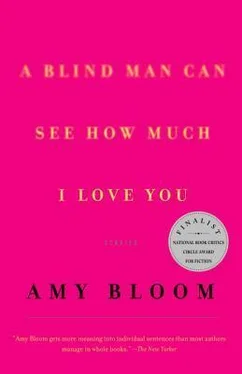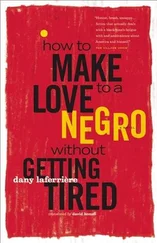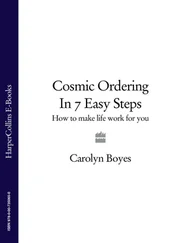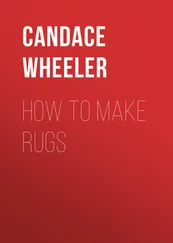By the end of June, though, she stopped trying to have me do the same for her. We just sat, and I’d bring in paintings from the year before, or even five years before, to give her something new to look at. And we looked hard, for hours, at the last painting she’d done on her own, not a sketch or an exercise, a finished piece called Lot’s Wife. The sky was grays and blues, beginning to storm, and in the foreground, in the barren landscape, was a shrouded figure. Or it could have been just the upright shroud itself, or a woman in a full-length muslin wrap. But the body was no longer alive; it had set into something dense and immobile. And far off to the right, bright and grim, were the little sticky flames of the destroyed city, nothing, not even rubble, around it.
“It’s so sad,” I complained to my mother.
“Is it?” She hardly talked anymore; she didn’t argue; she didn’t command. She never said, “Can I make a suggestion?” A few requests for nothing much, mostly silence. She took a deep breath. “Look again. The sky is so full and there is so much happening.” She looked cross and disappointed in my perception until she closed her eyes and then she just looked tired.
My graduation was the next day and it went about the way I expected. I overslept. My father overslept. The aide didn’t wake us when she left. I didn’t even open my eyes until Kay called me from the pay phone at school. I told her I didn’t know if I could get there on time. I didn’t know if I wanted to. I asked my father, who shrugged. He was still half asleep on his couch.
“I don’t know if you want to go, Delia. I suppose you should. I could come if you like.”
My father was, and is, a very quiet man, but he wasn’t always like that. This past year she took the life right out of him. I have spent one whole year of my life with a dying woman and a ghost.
I went, in my boxer shorts and ratty T-shirt, and until I saw all the girls slipping their blue robes down over off-the-shoulder clouds of pink and white, I forgot that we were supposed to look nice. Kay flattened my hair with spit, stuck my mortarboard on my head, and elbowed me into our section (Barstow, Belfer). In our class picture there are five rows of dyed-to-match silk shoes and polished loafers and a few pairs of sneakers and my ten dirty toes. I didn’t win any prizes either, which I might have if I hadn’t been absent for fifty-seven days my senior year.
Kay’s parents, who are extremely normal, dropped me off on their way home to Kay’s graduation party. Mrs. 118 Belfer showed me the napkins with Kay’s name flowing across in deep blue script, and she reached into the bag on the front seat to show me the blue-and-white-striped plastic glasses and the white Chinet plates.
“Send our … Tell your father we’re thinking of you all,” Mrs. Belfer said. Kay and I had made sure our parents didn’t know each other, and even when my mother was okay, she was not the kind of person to bond with other mothers.
My father made room for me on the porch swing. He ran one finger over the back of my hand, and then he folded his arms around his chest.
“How’d it go?”
“Okay. Mr. Switzer says hi.” Mr. Switzer was my ninth-grade algebra teacher. He used to play chess with my father, when we had people over.
“That’s nice. You were a hell of a chess player a few years ago. Eight years ago.”
I didn’t even remember playing chess; my father hadn’t taken the set out for ages, and when he did, he didn’t ask me to play, he just polished the marble pieces and rubbed a chamois cloth over the board. My mother got him that set in Greece, on their honeymoon.
“Eight years ago I was a chess player?”
My father shut his eyes. “I taught you when you were five. Your mother thought I was crazy, but she was wrong. You were good, you got the structure immediately. We played for a few years, until you were in fourth grade.”
“What happened?” I saw him sitting across from me, thinner, with more brown hair. We were on the living room floor, a little bowl of lemon drops between us. My mother was cooking chicken in the big red wok, and the chess pieces were gray-and-white soldiers. My queen was gray with one white stripe for her crown.
“Mommy got sick, the first time. You don’t remember?”
I didn’t say anything.
“You don’t have to remember, Delia. We don’t even have to talk about this now. Your mother says, your mother used to say, that I don’t say what needs to be said.”
He put his head back, and I did too. We looked up at the old hornet’s nest in the corner of the porch.
“Car accidents or no, she’s going to die. She is going to leave us to live this life. Even if I am blind drunk and you are dead in a ditch, she is still going.”
The swing creaked, and I watched our feet flip back and forth, long, skinny feet, like our hands.
“The aide’s leaving. Let’s go upstairs. It’ll be a treat for your mother, two for the price of one.”
“I’ll stay here.”
His fingers left five red marks on my arm, which bruises up at nothing.
“Please come.”
The swing rocked forward, free of us, and I followed him.
________
When she died that night, I wrapped the painting of Lot’s wife in an old sheet and hid it in the closet, behind my winter boots. My father said it was mine. We sprinkled her ashes at the Devil’s Hopyard.
My father began tucking me in, for the first time in years. He did it for weeks. We still hadn’t really cleaned up, not ourselves, not the house. My father stepped over my CDs and cleared a space for himself on my bed. He said, “It’s a little late for bedtime stories, I guess.”
“Tell me about Mommy.”
“All right,” he said. “Ask me something. Ask me anything.”
“Anything?” I didn’t even know how many siblings my father had, and now I could ask him anything?
My father put the bottle of Jack Daniel’s on the floor and rubbed my feet. “Cast discretion to the winds, Delia.”
“Why did Mommy get cancer?”
“I have no idea. I’m sorry. Next?”
“Did Mommy mind your drinking?”
“Not very much. I don’t think I drank too much when she was well, do you?”
“I don’t remember. Next. Were you and Mommy virgins when you got married?”
My father laughed so hard he stamped his feet up and down and wiped his eyes.
“Christ on a crutch, no. Your mother had had a dozen lovers before me — I think a dozen. She may have rounded down to the nearest bearable number. I was a callow youth, you know, I didn’t really appreciate that being last was much, much better than being first. And I had slept with two very patient girls when I was at Swarthmore. Slept with. Lain down with for a few afternoons. Sorry. Too much?”
“Was it great, with Mommy?” I said this into my pillow.
My father pushed the pillow away from my ears. “It was great. It was not always fireworks, but it was great, and when it was fireworks—”
“She rocked your world.”
My father patted my feet again. “That’s right. That’s a great expression. She rocked my world.”
Istill don’t know where to hang the picture. My father says no room in our house is right for it. We don’t want it to be in a museum. I unwrap it at night and prop it up next to my bed and fall asleep with my hand on the clean canvas edge, and I smell the oil and the wood frame, and I smell salt.
Help me.
I slid my hands up the legs of Jack’s shorts to stroke the top of his thigh, and he lost his grip on the paint roller. A hundred tiny drops flew through the air at me. Thoroughly speckled, squinting to keep the paint out of my eyes, I stroked higher under his boxers, right up the neat, furry juncture of his crotch.
Читать дальше












